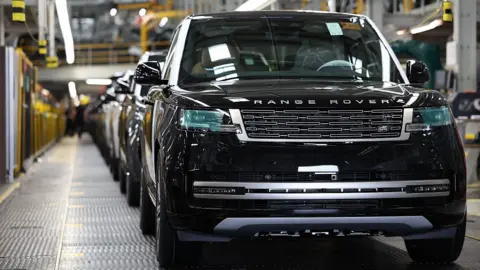UK car making plunges to lowest for over 70 years
 Getty Images
Getty ImagesThe number of vehicles manufactured in the UK fell sharply last month, as US tariffs and the timing of Easter hit production.
The 59,203 vehicles made was the lowest April output for more than 70 years, with the exception of 2020, when production effectively stopped during the Covid lockdown.
The Society for Motor Manufacturers and Traders (SMMT) said a wider change in the industry as it shifts from petrol cars to electric vehicles (EVs) had also temporarily reduced output.
However, new trade deals with the US, EU and India may help boost upcoming production, the industry group said.
The April figure was 16% lower than the same month last year, and a quarter lower than March, when numbers were likely to have been boosted by manufacturers shipping more cars to the US before President Trump's 25% tariff on steel, aluminium, and cars kicked in.
On Wednesday, a US court blocked many of Trump's tariffs, but the ruling does not apply to the tariff on steel, aluminium, and cars.
British car maker Jaguar Land Rover (JLR) is paying 27.5% tariffs on everything it ships to the US, which it said is costing it "a huge amount of money".
The firm sends cars from its UK business to its US business - meaning it pays both export and import taxes on any cars it sends across the Atlantic.
The company also said it is frustrated that the new deal agreed in early May between the UK and US to reduce tariffs on cars to 10% up to a quota of 100,000 vehicles is taking so long to come into effect.
The fact that Easter fell in April this year, which meant there were fewer working days, was another reason car making fell, the SMMT said.
The lowest April output before that - outside the pandemic - was back in 1952, when 53,517 vehicles were produced.
Car production for exports fells by 10.1%, said the SMMT, driven by falls in demand from the UK's biggest export markets the US and EU.
The group said the total number of vehicles manufactured in the UK for the first four months of the year was the lowest since 2009.
Nathan Coe, chief executive of online car seller Autotrader, said those exporting to the US have taken a bigger hit than the UK's domestic market, which he says remains buoyant.
"If you look at the UK market itself, actually, there's been more new cars sold, more used cars sold. But if you look at manufacturing itself, because of those export impacts, those numbers are down," he said.
He added the UK could be seen as an attractive market for foreign automakers, as it has now become expensive to sell cars in the US.
The SMMT's figures show car production for the UK market was down by 3.3% in April compared to a year ago.
Autotrader's share price sank 12% early on Thursday as it reported a 5% bump in sales but warned of economics "uncertainties".
The downward trend in production is similar in other countries, said Prof Peter Wells, director of the Centre for Automotive Industry Research at Cardiff University.
"There are concerns in Germany, Italy, France and Japan," he told the BBC.
"So I would emphasise that there is this bigger picture going on, and it's not purely a UK phenomenon."
However, some of the global pressures may be stronger in the UK, Prof Wells said, such as fewer trade barriers against Chinese imports compared to the EU and US.
The UK government's change in policy over encouraging more manufacturing of EVs had also made planning more difficult for carmakers, he added.
In April, the UK announced plans to relax sales targets for EVs and reduce fines for cars that do not meet certain emissions standards.
In recent years, the UK has seen producers such as Honda and Ford shut down plants.
Last year, Stellantis - which makes Vauxhall, Citroen and Peugeot cars - warned it may have to halt UK production due to uncertainty over the government's approach to EVs.
"What industry always wants is stability and clarity in policy, whether it's tariffs or electrification or any other issue," said Prof Wells.
"For me at least, it remains a volatile environment in that sense."
